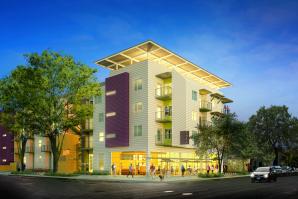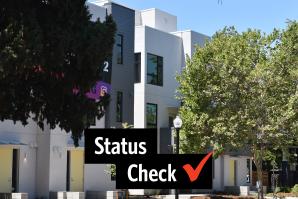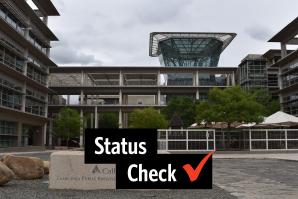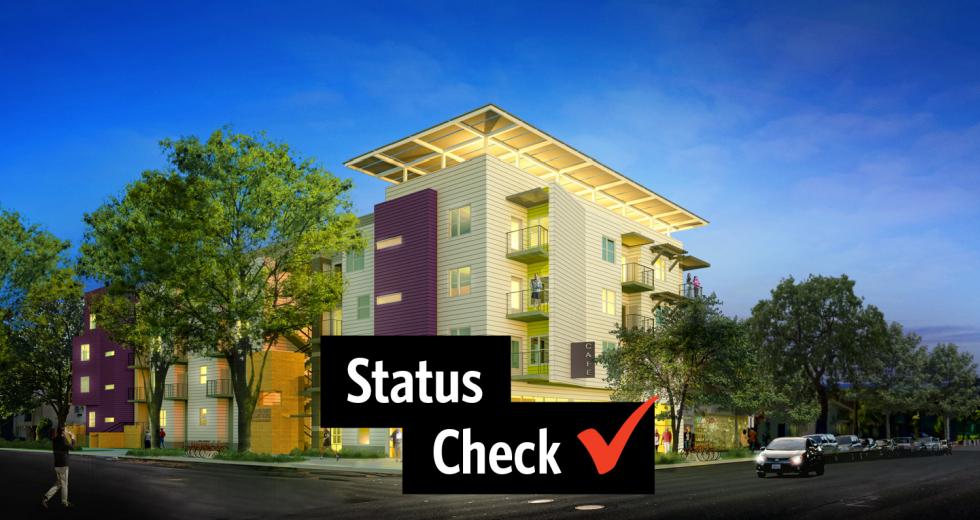The vacant lot at 16th and F streets in Sacramento — the future site of Lavender Courtyard, the city’s first LGBTQ-friendly affordable housing for older adults — is still empty, but it won’t be for long.
Comstock’s previously reported on Lavender Courtyard in January 2019. At that time, Roberto Jiménez, the CEO of Mutual Housing California, the sustainable housing organization leading the project, said the $27.1 million development would be 95 percent funded once the Sacramento Housing and Redevelopment Agency accepted Mutual Housing’s application to receive tax-exempt federal bonds. Jiménez projected breaking ground by summer 2019 — but the economy had other plans.
Related: Lavender Courtyard Will Be the Central Valley’s First Affordable Housing Community for LGBTQ Seniors
Jiménez says because federal tax credit and bond programs are used to cover the majority of the expense of developing an affordable housing community, California’s dramatically escalating land and labor costs caused the percentage of funds covered through those federal programs to shrink. Local and state resources were then needed to fill the gap, which Mutual Housing secured after California voters passed Proposition 1 and Proposition 2 in November 2018, which authorized bonds for housing-related programs for veterans, homelessness prevention and those in need of mental health services.
In mid-April, the last financial piece finally fell into place. Lavender Courtyard received $11.2 million in state Multifamily Housing Program funds administered through the California Department of Housing and Community Development in a process Jiménez calls “very competitive.” Mutual Housing was then able to negotiate with investors to buy those tax credits in exchange for cash and have partnered to that end with Enterprise Community Partners, a private national organization that invests in affordable housing projects.
With this partnership, the project is now fully financed through a combination of tax credits, a $2.5-million grant from The Harry and Jeanette Weinberg Foundation, a construction loan, and $1.9 million in federal HOME funds approved in 2016 by the Sacramento City Council and locally administered through SHRA. Mutual Housing has 180 days to break ground from the point the financing was awarded. Once the project’s construction loan closes in September, Jiménez expects to start building by the end of the year.
The 32,200-square-foot community in the Mansion Flats neighborhood designed by Sacramento-based Mogavero Architects will include 49 one-bedroom units and four two-bedroom units for applicants 62 years and older, with 24 of the 53 units reserved for LGBTQ seniors coming out of homelessness.
Lavender Courtyard will also provide wraparound services, such as identity-affirming health care and advocacy and community resources for its tenants through Lutheran Social Services of Northern California and the Sacramento LGBT Community Center, which will be able to expand its wellness and advocacy services because of the new housing development. Nonprofit health care clinic One Community Health had been identified as a partner last year, but a change of leadership has put its participation on hold. Servant Hearts, which sponsors awareness and empowerment projects for LGBTQ youth and seniors, may also participate, but isn’t confirmed yet.
As soon as Lavender Courtyard begins accepting applications, units will be offered through a waiting list and possibly a lottery, since the demand for affordable housing, especially for LGBTQ older adults, is so high, Jiménez says, because it’s not widely available in this part of the state and because of the current recession.
“In the midst of a dark economic crisis, this project finally coming to fruition is a big boost to our morale in the city and for people that desperately need affordable housing,” says Sacramento City Councilman Steve Hansen, a proponent of the project, which is in his district.
Jimenez concurs: “It’s very exciting to be able to partner with complementary organizations to provide such an important resource. To even be able to build affordable housing in this rapidly gentrifying neighborhood is exciting — we wouldn’t be able to afford the land if we were to try to buy it now. We (started this project) at the right time.”
Recommended For You

Lavender Courtyard Will Be the Central Valley’s First Affordable Housing Community for LGBTQ Seniors
When Kaye Crawford spoke at the wake of friend Darrin Heiden in 2014, she talked about the fact that Heiden was “another statistic of a gay man who found himself without a home as he grew older.”

Status Check: Residential Boom on Broadway
The conversion of former Tower Records, Books and Video site is one of several current housing projects in Sacramento’s Broadway corridor
For decades, Tower Records, Tower Books and Tower Videos defined the southeastern corner of 16th Street and Broadway in Sacramento. In their place could come a 53-unit apartment building — part of the next wave of development for Broadway.

Status Check: Cloudy Days for Pensions?
COVID-19 might lead to even fewer defined-benefit pensions in the private sector
It’s still early to fully gauge what effects the coronavirus economic shutdown will have on the pension landscape, but the preliminary outlook for certain parts of the industry, particularly with defined-benefit plans, isn’t encouraging.

Status Check: Getting Creative to Solve Homelessness
Urban Land Institute hosts panel event on alternative housing strategies in Sacramento
Sacramento Mayor Darrell Steinberg made a pitch to the crowd during his introductory remarks at an Urban Land Institute program addressing homelessness: “We need a Silicon Valley moment around efficient housing strategies in California.”



